What foods should I eat…or avoid if I have IBD? Here are some proper nutrition tips for ulcerative colitis
Ulcerative colitis is a form of Inflammatory Bowel Disorder (IBD) that creates painful ulcers in the large intestinal tract and the rectum. One of the main causes of ulcerative colitis is poor digestion.
Sufferers of ulcerative colitis experience symptoms such as:
- Chronic diarrhea
- Inflammation of the colon
- Stomach cramping
- Nausea
- Excess weight loss
- Fever
- Fatigue
- Vitamin B12 deficiency
(Read more about preventing vitamin B12 deficiency here: B12 Deficiency: Don’t Ignore the Symptoms)
Some good rules of thumb
While diet doesn’t cause ulcerative colitis, it does affect chronic pain symptoms that are associated with IBD.
Below are some helpful food preparation tips for eating with ulcerative colitis:
- Cook vegetables well. Raw or partially cooked vegetables are difficult for ulcerative colitis patients to digest completely.
- Cut your food into small pieces that are easy to masticate thoroughly.
- Avoid very small food morsels, such as corn kernels and peas; swallowing tiny bits of food without chewing them properly creates stomach upset, such as cramping and diarrhea.
- If you experience any setbacks, it’s a good idea to restrict high fiber food items, such as whole wheat breads, legumes, and cereals, at least until your diarrhea has subsided.
Ten foods to avoid if you have ulcerative colitis:
Caffeine
Caffeine not only draws water out of our system, contributing to dehydration, but it also triggers bowel movements.
If you have ulcerative colitis or any other type of IBD, then caffeinated teas, coffee, and chocolate could wreak havoc on your digestive system, in addition to robbing your body of much-needed fluids.
Try sipping on something more tummy-friendly, such as comforting herbal tea and carob chip cookies.
Trouble staying awake? Read: Boost Energy Now! 20 Practical Tips for Fighting Fatigue
Bubbly Beverages
Carbonated drinks are refreshing, but they are full of tiny air bubbles. Swallowing excess amounts of air causes flatulence and irritates the stomach linings of chronic colitis patients. If you cannot resist the lure of an icy cola on a hot day, then sip slowly. Nix the straw, as it will only make you swallow even more air.
Alcohol
Alcoholic beverages act as stimulants, and may aggravate the intestines. However, not all alcoholic drinks are cut from the same cloth, so to speak. White wines go down easier than red wines. Avoid beer and mixed drinks that often cause diarrhea. B12 and Alcohol Consumption
Milk Products
Contrary to popular belief, there is no direct correlation between lactose intolerance and IBD, though individuals with irritable bowels might have a slight sensitivity to milk sugar.
If you have colitis, then your best option is to cut back on dairy whenever possible. A pat of butter on some low-fiber toast or a bit of milk in your coffee is okay, but don’t get into the habit of drinking large amounts of cow’s milk.
Opt instead for other calcium-rich foods such canned salmon (bone-in), collard greens, and fortified low-pulp orange juice.
Addicted to ice cream? Who isn’t? Try out one of these 10 Most Tempting Vegan Ice Cream Recipes.
Beans
Unless your body is accustomed to digesting beans and legumes, then you should proceed with caution.
For many of us, beans such as garbanzos and pintos are difficult to digest and cause uncomfortable bloating and gas.
That doesn’t mean you should cross three-bean salad or minestrone off your list, though, as beans are rich in protein and vitamin B12.
Some methods of cooking beans produce less gas, and chewing thoroughly helps to aid digestion. If you buy canned beans, rinse well to remove sugars, and experiment with pureed bean recipes, such as hummus or low-fat bean dip.
Stringy Veggies
Some vegetables are hard for IBD patients to absorb, and fibrous veggies such as broccoli, Brussels sprouts, onions, and celery are high on that list. Focus on the have’s instead of the have-not’s. You can have delicious, vegetarian side dishes without the accompanying tummy aches. Some yummy green-light veggies include roasted cauliflower, carrot pennies, and baked potatoes.
Seeds, Skins, and Pellets
Certain foods irritate the lining of the intestines as they shove their way through our digestive system. These include:
- Fruit seeds, such as those found in strawberries, figs, and melon
- Sunflower or pumpkin seeds
- Dried fruits
- Fruit skins, such as cranberries, blueberries and persimmon
- Spongy pithy foods, such as mushrooms, citrus rinds, and orange marmalade
- Fruity pellets, such as corn and pomegranate
Fatty Foods
Oil is not absorbed well in colitis patients, so avoid high-fat meals and condiments. These include:
- Rich sauces, such as Alfredo sauce and other cheesy toppings
- French fries, and other fried foods
- Fatty meats, such as steaks, ribs and hot dogs
- Condiments such as mayonnaise, melted butter, and rich salad dressings
Nuts
Small nut pieces are hard for the body to digest completely, and may irritate the stomach.
Colitis patients should avoid treats containing roasted peanuts, cashews, or raw almonds. Ground nuts and seeds are fine, though.
Small amounts of creamy peanut butter, all-natural almond butter, or tahini are great sources of healthy fats.
Whole Herbs and Spices
If you suffer from Inflammatory Bowel Disorder, that doesn’t mean that you have to suffer from a diet of bland, tasteless foods as well. Take advantage of the many pungent, sweet, and tangy herbs and spices that are available, but remember to grind them well.
If you buy dried seasonings, make sure that seedy spices such as cumin, pepper, and nutmeg have been ground to a fine meal. Chop up fresh herbs, such as dill, basil, and rosemary, into small pieces before adding them to casseroles, roasts, or sauces.
Read more about Crohn’s and colitis:
101 Helpful Sites for Kids ‘n Teens with Crohn’s (and their Parents)
On the Run with Crohn’s? 6 Ways to Ease Public Restroom Anxiety
“I’ve heard of the X Factor and Fear Factor…But what’s Intrinsic Factor?”
Sources:







